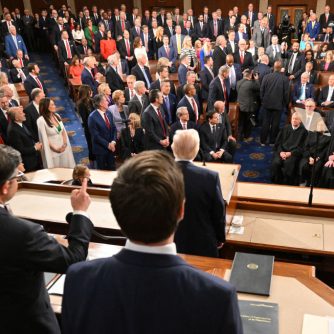On this episode of Carolina Newsmakers, political strategist Brad Crone joins Don Curtis to break down the key takeaways from the 2024 elections and what lies ahead for North Carolina’s political landscape. The conversation delves into the state’s shifting voter dynamics, legislative power struggles, and the implications of a divided government for policymaking in 2025.
Crone begins by highlighting North Carolina’s status as a battleground state, where voters split their preferences across party lines. While former President Donald Trump secured North Carolina’s electoral votes, the state also elected a Democratic governor, lieutenant governor, attorney general, secretary of state, and superintendent of public instruction. At the same time, Republicans maintained control of the state Senate and secured major victories in other key statewide positions, including a new Republican state auditor, state treasurer, and labor commissioner.
One of the biggest political storylines emerging from the election is the potential shift in legislative control. Republicans hold a supermajority in the state Senate but fell just short of maintaining one in the House. However, Crone notes that party-switching among lawmakers could once again alter the balance of power, citing previous defections that shifted control in 2023. If a single Democratic legislator flips parties in 2025, it could restore the GOP’s ability to override gubernatorial vetoes, limiting Governor-elect Josh Stein’s negotiating power.
Crone also explores the growing influence of unaffiliated voters, who now represent the largest voter bloc in the state. He argues that both parties must prioritize outreach to these voters, who increasingly determine election outcomes. Additionally, he predicts that ballot access will become a pressing issue, as unaffiliated candidates currently face more significant hurdles in running for office compared to their Democratic and Republican counterparts.
Turning to legislative priorities, Crone anticipates continued battles over education funding, economic development, and infrastructure investment. He highlights the controversy surrounding school choice programs, which Republican lawmakers support but public school advocates argue drain resources from traditional schools. The state’s response to Hurricane Helene and the ongoing need for flood insurance reform also remain high on the agenda, with policymakers considering a potential state-run flood insurance program to address gaps in coverage.
The discussion then shifts to North Carolina’s congressional delegation, with several new members taking office. Crone provides insights into key figures, including Addison McDowell, Mark Harris, and Brad Knott, who are expected to play influential roles in shaping federal policy. He also examines the potential impact of a new Trump administration, predicting a more aggressive approach to immigration enforcement and regulatory rollbacks.
As the episode concludes, Crone emphasizes the uncertainty surrounding the federal debt crisis and looming budget challenges. He underscores the importance of North Carolina’s balanced budget requirement, which forces lawmakers to make tough fiscal decisions, particularly in areas like public employee retirement funds and healthcare. With divided government at both the state and federal levels, he predicts that bipartisan cooperation—or lack thereof—will be a defining factor in the coming year.





